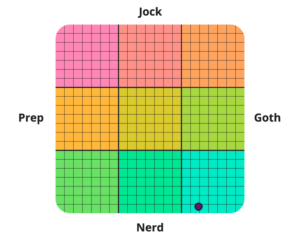15/2023
No review, as this book is a Philip K. Dick Award nominee, and I am the coordinator for the award ceremony at Norwescon. While I have no input into the selection of nominees or judging, I want to be sure to avoid any appearance of influence.

Enthusiastically Ambiverted Hopepunk
15/2023
No review, as this book is a Philip K. Dick Award nominee, and I am the coordinator for the award ceremony at Norwescon. While I have no input into the selection of nominees or judging, I want to be sure to avoid any appearance of influence.

A couple months ago, I replaced my old hand-me-down laptop (a 10-year old MacBook Pro) with a shiny new M2 MacBook Air — my first brand-new laptop. And while it is very pretty, and it was tempting to leave it as-is…after a couple months of dithering, I decided to go ahead and personalize it with some of the stickers I’ve had sitting in a drawer for ages.
After all, what’s the point of keeping stickers in a drawer? There’s always the “I’ll put these on something…someday…” thought, and finally, “someday” is here.

In pride of place, dead center, covering the embedded shiny Apple logo, is a vintage rainbow Apple sticker. I’m not entirely sure how long I’ve been hanging on to this, but it has got to be close to a couple decades since Apple went all monochrome. I have one of these left, too.
Top left: “I was a Mac user when Apple was doomed.” From R. Stevens of Diesel Sweeties. I have the t-shirt, too. And it’s true!
Center left: Gothic Pride Seattle, repping the local SeaGoth community.
Bottom left: “Computer, end program.” How do you turn this damn holodeck off, anyway? Don’t remember the source.
Top center: “Creepy but Careful” by AmberStone, received as a bonus goodie when I got some of their vaccine-supporting enamel pins early in the pandemic.
Center right: “Highly illogical.” Yes, Spock, we know. Don’t remember the source.
Bottom right: Doom! Didn’t initially remember the source, but it has a URL for Chance of Doom, a webcomic by Robert Tritthardt, also part of the local SeaGoth community, so I probably got it from him at one point or another, possibly along with a Mercury shirt or hoodie or with one of the Writhe and Shine books I have.
14/2023
No review, as this book is a Philip K. Dick Award nominee, and I am the coordinator for the award ceremony at Norwescon. While I have no input into the selection of nominees or judging, I want to be sure to avoid any appearance of influence.

13/2023
No review, as this book is a Philip K. Dick Award nominee, and I am the coordinator for the award ceremony at Norwescon. While I have no input into the selection of nominees or judging, I want to be sure to avoid any appearance of influence.

I’ve seen this Jock-Nerd/Prep-Goth Test floating around Facebook for the past day, and gave in to peer pressure.

LARP stands for Live Action Role-Playing. It is a form of role-playing where participants physically act out their characters’ actions and interact with one another in a simulated world. In the Jock-Nerd/Prep-Goth Test, LARP should not be understood pejoratively or as exclusively pertaining to role-playing, but as someone who combines the geeky knowledge of nerds with the non-conformity of Goths to engage in gaming, fantasy-worlds and the like.
Sounds about right to me!
My usual unplanned, unrehearsed, seat-of-the-pants session where I’m just grabbing whatever seems right in the moment. Almost anything goes.
My usual unplanned, seat-of-the-pants, anything-goes style. Been a few months since I did this regularly, and I’ve got a gig coming up, so it’s time to get back into practice!
12/2023
No review, as this book is a Philip K. Dick Award nominee, and I am the coordinator for the award ceremony at Norwescon. While I have no input into the selection of nominees or judging, I want to be sure to avoid any appearance of influence.

11/2023
No review, as this book is a Philip K. Dick Award nominee, and I am the coordinator for the award ceremony at Norwescon. While I have no input into the selection of nominees or judging, I want to be sure to avoid any appearance of influence.
